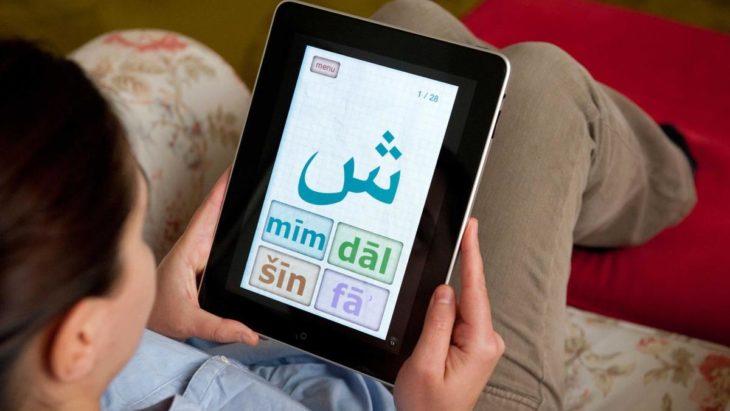So, you’ve read a lot about Arab culture and are interested in learning the language you keep telling yourself you can’t. The letters are different. The pronunciation is near impossible for you. You don’t have time.
Well, we’re here to tell you that, whatever your excuses, anyone can learn Arabic and the fact that you already have the desire to do so is a good sign. In fact, if you feel a bit overwhelmed by the language, chances are there is probably some mental obstacle in your way, but don’t worry. We can help you overcome those obstacles with a few simple techniques. With that in mind, we present you with eight of the most common problems that Arabic language learners face and offer you solutions to overcome those obstacles. The next thing you know, you’ll be saying to yourself, “Wow! My Arabic is really good. What was I so afraid of?”
Why It’s Important to Know Why You Feel You Can’t Learn Arabic
Now, you may be thinking to yourself: “Look, can’t you just tell me what I need to do to learn Arabic so I can start to speak Arabic today?”
Well, first, nobody knows you like you when it comes to identifying the reasons you think you will fail at Arabic. It could be a perceived fear, laziness or any number of things that you tell yourself that makes you feel incapable of learning the language, which brings us to our second point.
The feeling of failure can be very demotivating, but identifying what’s standing in your way can take the sting you feel out of your perceived failures. Once you can recognize that problem doesn’t lie with you but with your learning process, then you can correct these problems and see things in a whole new light. When you identify your challenges, it can give you a whole new outlook and with the right motivation and direction, even the hardest Arabic can seem like easy Arabic.
With all of this in mind, let’s look at nine possible obstacles that could be standing in your way when it comes to Arabic language learning.

Source: arabacademy
1. “All Work and No Play…”
While learning anything does require some focus and seriousness, when it starts to feel too much like work, you’re more likely to not look forward to it and maybe you’ll stop learning altogether. After all, nobody likes being bored to death, and when it comes to Arabic (or any other language for that matter), some of the things you need to learn, for instance, grammar, can get a bit tedious and tiring. So, what’s the solution?
Turn learning into a game
Whether you want to learn Arabic online or in a classroom, find other language learning friends around you or online and challenge them. Set a goal to see who can learn Arabic grammar or vocabulary the fastest. You can all agree on the words or grammar lessons and whoever is the first to remember them down pat is the winner.
You can also download a variety of games to play with your friends including those styled after the popular game show “Jeopardy” where you can put in topic like “Arabic grammar”, “Starts with ‘al’” and other related topics. Each friend bets a certain amount of points and if they give the correct question to the answer clues, they win the points they wagered. Once the board is cleared, the winner is the friend with the highest number of points.
If you can’t find other friends, don’t worry! There are plenty of other ways to have fun learning Arabic. For instance, you can download a “Wheel of Fortune” type of app that lets you but in up to 30 vocabulary words. Spin the wheel and it chooses one of those vocabulary words at random. Try to guess the meaning before looking at the answer. If you’re right you get a point. Try to get all 30 corrects and you’ll be a real winner!

Source: optilingo
2. Find the Right Approach for You
Researchers will tell you that learning style really does matter and when you are trying to learn a language independently, you should consider key factors like your personal preferred learning style, learning needs, objectives and beliefs. So, if you’ve just decided to download an Arabic language book off of the internet and watch a few videos on Youtube maybe this is not exactly the right approach for you, and this could be what’s preventing you from learning Arabic. The solution to his, however, is to try multiple approaches at once.
During your first week or so, try a different approach or two every day to see which ones work best for you and meet the criteria mentioned by researchers above. When you’ve decided which ones work, stick to them like superglue to help you overcome this obstacle of using the wrong learning approaches.
3. You’re Flatlining
When you first start learning Arabic for beginners, you may find that trying to learn Arabic alphabet letters isn’t so difficult and all the basic Arabic words seem to be coming so naturally that your heart starts racing with excitement.“Wow, what was I so afraid of?” you think to yourself. Then, as time goes by, you find that the excitement has started to wane a bit and the next thing you know, you’ve flatlined – you’ve reached a point where you don’t feel you’re progressing at all; rather, you’re remaining static in your Arabic language learning process.
First, you’re not alone. Students who flatline tend to face the same lingering Arabic language learning problems including limited vocabulary, difficulty in speaking, persistent errors, simple word usage, and sounding “foreign”.
The best way to learn Arabic when you’re flatlining is adding new life to your Arabic by interacting with native speakers. Intermingling with native speakers is a great solution that addresses many of the critical issues you face when you flatline. Your vocabulary will naturally increase based on what you want to talk about. Likewise, the more you talk, the more you will pick up and mimic your partner’s speaking style which will enable you to sound more natural. Their feedback, should they offer it, is also invaluable in helping you to overcome the same old mistakes you keep making, thus helping you to move forward in your Arabic language journey.

Source: middleeasteye
4. Understand Some Things May Be Out of Your Control
Research has shown that There are many factors that can put you at a bit of a disadvantage, but despite of all this research, it’s still not very clear whether or not people who have these advantages were born with them or got them through life experience. One thing is true, however: Some people have an easier time learning Arabic than others do. So what can you do if you’re not one of those people who have little difficulty learning Arabic?
Well, for starters, you can see these disadvantages as a challenging way to overcome these advantages in other ways. Once you discover that learning might not come as easily for you as some of your Arabic language learning partners, this can allow you to take some pressure off yourself; however, that doesn’t mean you should stop working. It’s quite the opposite, actually, because if you put in a little extra effort, you will reap bigger benefits for yourself. So what if it takes you a bit longer than some of your Arabic language learning mates. Let the challenge drive you to succeed. In the end you’ll be just as good (or maybe even better) than those who find learning Arabic a little bit easier than you do.
5. What’s Your Motivation?
Motivation plays a key role in all aspects of life; however, when it comes to learning Arabic, what motivates you to learn it can make a big difference in either learning just enough to get by or mastering the language like a native. It can lead you to interact more with native speakers and practice your Arabic language learning strategies. Motivation is also linked to how well you’ll perform on achievement and proficiency tests. So if you’re struggling to learn Arabic, you might want to consider the reason you’re doing it and keep those reasons right in front of you.
Keeping a journal or putting a couple of travel posters around your study area are just a couple of ways you can keep your motivation right in front of you. Reviewing the reasons why your learning Arabic or visual reminders of your end goals can be very beneficial in motivating you to learn the language.

Source: thenational
6. Know Your Goals
No goals equals no direction equals no progress. Sure you might pick up a few Arabic words here and there, but do you really want just a few words to get by on or do you want to immerse yourself in the Arabic language and Arab culture? If you want to keep moving forward, the easiest way to do that is by setting goals for yourself.
First create both your long and short-term goals. For example, a long-term goal may be to be able interact with native speakers in Arabic comfortably in six months. Your short-term goals the steps it takes to reach this. Maybe you’ll decide to study and practice 10 vocabulary words per day. Maybe you’ll watch Arabic films for one hour a day with subtitles with the long term goal of watching a whole film without subtitles. Whatever your goal, make sure they are specific goals that you can achieve and know for sure when you’ve achieved them.
Next, keep track of your goals on a calendar so you know when you’re supposed to meet those goals. This will make it easier to keep track of your progress and allow you to adjust accordingly when you’ve fallen behind or exceeded your goals faster than you thought you would.
Finally, when you meet your goals, reward yourself. These can be small things like a falafel sandwich when you’ve reached your weekly goals or a trip to one of the Arabic speaking countries when you’ve reached your goal of mastering the language.
7. Become Fearless
There is no doubt that your fears of learning Arabic are real, but that doesn’t mean you should allow it to control you and miss out on learning the language. Your fear will keep you from practicing, which will keep you from progressing. Not only is this a viscous circle, but your fear can lead to anger and frustration with learning Arabic, neither of which are helpful in your learning process.
Understand that your feelings are real and that it’s okay to be anxious. This self-awareness can reduce your stress and build your confidence as it will motivate you to find ways to work around your anxiety.
One way you can do this is through downloading an Arabic language learning app. You can use this independently without the fear of embarrassment if you make a mistake. And the more you progress within these apps, the more you build up your confidence in the Arabic language. One of the best Arabic language learning apps is available for download at kaleela.com. Not only does it allow you to learn at your own pace, but it also offers you the choice of many different Arabic dialects such as the Levantine dialect or you can even learn Egyptian Arabic. Go to kaleela.com for more info.

Source: yourabudhabiguide
8. “If Don’t Use It, You Lose It.”
Yes, this phrase may be used a little too much in language learning today, but it’s still around because it rings true. Arabic is meant to be used, and it would be a shame to put all the time and effort into learning it only to never use it (and, yes, eventually lose it). So immerse yourself in the language on a regular basis.
If you have Arabic speaking friends, practice with them. Go where they hang out, eat, and live. Arabs are very hospitable and love sharing their language with someone who is eager to learn it. If you can’t find anyone near you, try social media groups, Youtube videos, online Arabic radio stations, whatever it takes for you to immerse yourself in the language and culture.
So if you think you can’t learn Arabic, think again.
By identifying what’s keeping you from learning and overcoming those obstacles, you will be on your way again on the road to Arabic fluency!
Whether you want to know more about the Arabic language or Arab culture, we’re here with you every step of the way. And don’t forget to download our Arabic language learning app, available for both I-phone and Android devices. Visit kaleela.com for more info.
